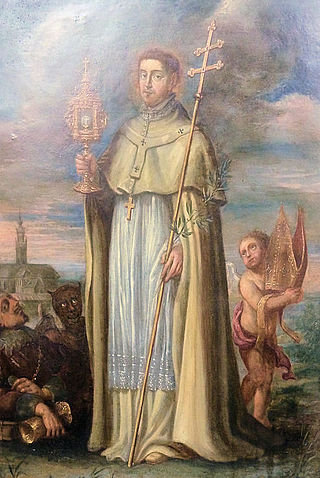See also
- Sigismund
- Zsigmond Kornfeld (1852–1909), Hungarian banker and baron
- Zigmunds Skujiņš (born 1926), Latvian writer
Zygmunt, Zigmunt, Zigmund and spelling variations thereof are masculine given names and occasionally surnames. It has the same etymology as the Germanic name Zigmund . People so named include:
Sigismund is a German proper name, meaning "protection through victory", from Old High German sigu "victory" + munt "hand, protection". Tacitus latinises it Segimundus. There appears to be an older form of the High German word "Sieg" (victory): sigis, obviously Gothic and an inferred Germanic form, and there is a younger form: sigi, which is Old Saxon or Old High German sigu. A 5th century Prince of Burgundy was known both as Sigismund and Sigimund . Its Hungarian equivalent is Zsigmond.
Zbigniew is a Polish masculine given name, originally Zbygniew. This West Slavic name is derived from the Polish elements Zby- and gniew, meaning "anger". The Czech form of this name is Zbyněk.
Witold is a masculine Polish given name. This name derives from the Lithuanian “Vytautas” composed of two elements: “vyti” (chase) plus “tauta”, but It is also possible that it is a name of Germanic origin which means "ruling the forest". Notable people with the name include:
Tadeusz is a Polish first name, derived from Thaddaeus.

Norbert is a Germanic given name and infrequent surname, from nord "north" and berht "bright".
Antonin, Antonín, and Antoñín are masculine given names. Antonín, a Czech name in use in the Czech Republic, and Antonin, a French name in use in France, and French-speaking countries, are both considered alternate forms of Antonino. Antoñín, a Spanish name in use in Spain and Spanish-speaking countries, is a diminutive form of Antonio. As a surname it is derived from the Antonius root name. Notable people with these names include:

Bartłomiej Nowodworski High School in Kraków, Poland, is one of the oldest secondary schools in Poland. Its current location is on Na Groblach Square, just across the Planty from the Kraków Old Town and a few hundred meters from Wawel Castle.
Janusz is a masculine Polish given name. It is also the shortened form of January and Januarius.
Luigi is a masculine Italian given name. It is the Italian form of the German name Ludwig, through the Latinization Ludovicus, corresponding to the French name Louis and its anglicized variant Lewis.

Powązki Military Cemetery is an old military cemetery located in the Żoliborz district, western part of Warsaw, Poland. The cemetery is often confused with the older Powązki Cemetery, known colloquially as "Old Powązki". The Old Powązki cemetery is located to the south-east of the military cemetery.
Franciszek is a masculine given name of Polish origin. It is a cognate of Francis, Francisco, François, and Franz. People with the name include:
Sigmund, also spelled Siegmund, is a Germanic given name with roots in proto-Germanic *segaz and *mundō, giving a rough translation of "protection through victory".

Stanislav or Stanislaus is a given name of Slavic origin, meaning someone who achieves glory or fame. It is common in the Slavic countries of Central and Eastern Europe and Southeast Europe. The name has spread to many non-Slavic languages as well, such as French, German, and others.
Karol is a Basque, Polish, Slovak, and Slovene masculine given name that is a form of Karl or Karolus. Notable people with the name include the following: